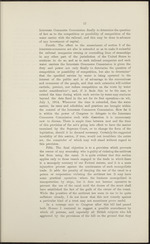| 1 |
 |
“...private property
of any kind by reason of the grants contained in this treaty or
by reason of the operations of the United States, its agents or
employees, or by reason of the construction, maintenance, operation,
sanitation, and protection of the said canal or of the works of
sanitation and protection herein provided for, shall be appraised
and settled by a joint commission appointed by the governments
of the United States and the Republic of Panama, whose decisions
as to such damages shall be final, and whose awards as to
damages shall be paid solely by the United States. No part of
the works on said canal or the Panama railroad or any auxiliary
works relating thereto and authorised by the terms of this treaty
shall be prevented, delayed or impeded by or pending such
proceedings to ascertain such damages. The appraisal of said
private lands and private property and the assessment of damages
to them shall be based upon their value before the date of this
convention.
Article VII.
The Republic...”
|
|
| 2 |
 |
“...to a decision; but in case
of disagreement of the commission (by reason of their being
equally divided in conclusion) an umpire shall be appointed by
the two governments, who shall render the decision. In the event
of the death, absence or incapacity of a commissioner or umpire,
or of his omitting, declining or ceasing to act, his place shall be
filled by the appointment of another person in the manner above
indicated. All decisions by the majority of the commission or by
the umpire shall be final.
Article XVI.
The two governments shall make adequate provisions by
future agreement for the pursuit, capture, imprisonment, detention,
and delivery within said zone and auxiliary lands to the authorities
of the Republic of Panama, of persons charged with the commit-
ment of crimes, felonies, or misdemeanours without said zone,
and for the pursuit, capture imprisonment, detention, delivery
without said zone to the authorities of the United States, of persons
charged with the commitment of crimes...”
|
|
| 3 |
 |
“...modify, reverse, or
affirm the final judgments and decrees of the District Court of the
Canal Zone and to render such judgments as in the opinion of the
said appellate court should have been rendered by the trial court in
all actions and proceedings in which the Constitution, or any statute,
treaty, title, right, or privilege of the United States, is involved and
a right thereunder denied, and in cases in which the value in con-
troversy exceeds one thousand dollars, to be ascertained by the oath
of either party, or by other competent evidence, and also in criminal
causes wherein the offense charged is punishable as a felony. And
such appellate jurisdiction, subject to the right of review by or
appeal to the Supreme Court of the United States as in other cases
authorized by law, may be exercised by said circuit court of appeals
in the same manner, under the same regulations, and by the same
procedure as nearly as practicable as is done in reviewing the final
judgments and decrees of the district...”
|
|
| 4 |
 |
“...operation, or for the
purpose of asking an order to install new service not in conflict
with the provisions of this paragraph. The commission may on
its own motion or the application of any shipper institute procee-
dings to inquire into the operation of any vessel in use by any
railroad or other carrier which has not applied to the commission
and had the question of competition or the possibility of com-
petition determined as herein provided. In all such cases the order
of said commission shall be final.
If the Interstate Commerce Commission shall be of the opinion
that any such existing specified service by water other than through
the Panama Canal is being operated in the interest of the public
and is of advantage to the convenience and commerce of the
people, and that such extension will neither exclude, prevent, nor
reduce competition on the route by water under consideration,
the Interstate Commerce Commission may, by order, extend the
time during which such service by water may continue...”
|
|
| 5 |
 |
“...delegate to the Interstate
Commerce Commission such wide discretion it is unnecessary
now to discuss. There is ample time between now and the time
of this provision of the act’s going into effect to have the matter
examined by the Supreme Court, or to change the form of the
legislation, should it be deemed necessary. Certainly the suggested
invalidity of this section, if true, would not invalidate the entire
act, the remainder of which may well stand without regard to
this provision.
Fifth. The final objection is to a provision which prevents
the owner of any steamship who is guilty of violating the antitrust
law from using the canal. It is quite evident that this section
applies only to those vessels engaged in the trade in which there
is a monopoly contrary to our Federal statute, and it is a mere
injunctive process against the continuance of such monopolistic
trade. It adds the penalty of denying the use of the canal to a
person or corporation violating the antitrust law. It may have
some...”
|
|
